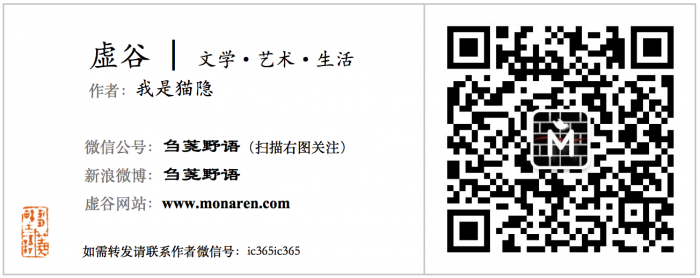牛奶泼湿了我们的床褥,我无法宽恕
人们说两张嘴的孩子一无是处
诗歌里,不仅有浪漫的神话传说,也有残酷的社会现实,比如这首《写给中国女性的盘头诗》(Pantoum for Chinese Women)。
Pantoum for Chinese Women
At present, the phenomena of butchering, drowning
and leaving to die female infants have been very serious.
–The People’s Daily, Peking, March 3rd, 1983
They say a child with two mouths is no good.
In the slippery wet, a hollow space,
Smooth, gumming, echoing wide for food.
No wonder my man is not here at his place.
In the slippery wet, a hollow space,
A slit narrowly sheathed within its hood.
No wonder my man is not here at his place:
He is digging for the dragon jar of soot.
That slit narrowly sheathed within its hood!
His mother, squatting, coughs by the fire’s blaze
While he digs for the dragon jar of soot.
We had saved ashes for a hundred days.
His mother, squatting, coughs by the fire’s blaze.
The child kicks against me mewing like a flute.
We had saved ashes for a hundred days,
Knowing, if the time came, that we would.
The child kicks against me crying like a flute
Through its two weak mouths. His mother prays
Knowing when the time comes that we would,
For broken clay is never set in glaze.
Through her two weak mouths his mother prays.
She will not pluck the rooster nor serve its blood,
For broken clay is never set in glaze:
Women are made of river sand and wood.
She will not pluck the rooster nor serve its blood.
My husband frowns, pretending in his haste
Women are made of river sand and wood.
Milk soaks the bedding. I cannot bear the waste.
My husband frowns, pretending in his haste.
Oh, clean the girl, dress her in ashy soot!
Milk soaks our bedding, I cannot bear the waste.
They say a child with two mouths is no good.
这首诗发表于1985年,序言引用了1983年3月3日《人民日报》上刊登的一则消息,指出当时女婴的生存境况仍然十分艰难。
诗人是美国著名亚裔作家、加州大学教授林玉玲(Shirley Geok-lin Lim),她的父亲是中国人,但她出生于马来西亚,从小不仅会说当地的方言,而且能说闽南语和英语。因此,她的作品中也经常体现跨文化的人文关怀。
在这首盘头诗里,她隐约勾勒了一个残杀女婴的故事,引起人们对女性生存境况的思考。
They say a child with two mouths is no good.
他们说有两张嘴的孩子一无是处
In the slippery wet, a hollow space,
湿漉漉的雨天,一个空空的地方,
Smooth, gumming, echoing wide for food.
溜滑溜滑,咂巴咂巴,嗷嗷待哺。
No wonder my man is not here at his place.
难怪我的男人在跟前待不住
在提到女婴的时候,诗人并没有用female infant,而是用了a child with two mouths,突出了一种强烈的性别意识,正是性别上的问题对女性的心理造成了压迫,而外在的雨天与贫困的生活,使得人生愈发内外交困。”a hollow space”是双关语,不仅指家徒四壁,也指婴儿空空的嘴。在这样的境况下,男人不知去向,更让女人感到不安与自责。
第一节奠定了整首诗的基调。
之后的七个小节,每小节的1、3句都是前面的重复,2、4句则是故事的新内容。诗节押abab bcbc cdcd的韵式。
诗里写了四个人:新生的女婴和母亲、父亲以及祖母。叙述者是母亲。
婴儿在母亲怀中踢着小腿,嘤嘤哭泣;妈妈则忐忑地抱着孩子,等外出的丈夫归来。她的丈夫去挖一个龙纹陶罐了,罐子里装着煤灰。这是他们三个月前就准备好的。祖母坐在火堆旁咳嗽,她只能默默地等待着那个时刻到来,破罐儿永远上不了釉。
诗中不断强调着性别的意识。这种意识不仅体现在婴儿身上,而且也深刻地影响着上一代的女性,也即祖母。
The child kicks against me crying like a flute
Through its two weak mouths. His mother prays
Knowing when the time comes that we would,
For broken clay is never set in glaze.
Through her two weak mouths his mother prays.
She will not pluck the rooster nor serve its blood,
For broken clay is never set in glaze:
Women are made of river sand and wood.
两张嘴的意象把祖孙两代联系在一起,让读者深深感受到,性别的尊卑意识已经积习难返,女性的无助感始终在漫延,却无人能改变。孩子哭泣着,祖母祈祷着。这不是一个值得庆贺的时刻,破罐儿上不了釉。在祖母心里,女人只是河底的沙和漂浮的木,只能随波逐流,身不由己。盘头诗每节的两句重复起到了强调作用,让诗中对女性命运的想法成为一种自我安慰。
女性的物化体现在隐喻中。“破罐儿”(broken clay)相对“龙纹陶罐”(dragon jar),暗示了女人的卑微无用,而龙纹陶罐里装着煤灰,暗示了对女性的扼杀。
然而,诗歌的叙述者却没有任何怨言。她早已接受了这样的境遇,那罐要命的煤灰三个月前就准备好了,她没有抵抗,也无力反抗。这就是最沉重的现实,也是这首诗震人心魄、发人深省之处。
盘头诗,又称“潘图诗”或“潘多姆”,英文pantoum/pantun,最早源于15世纪的马来西亚,特征是每小节都有两句会在下一节重复,诗节之间的黏粘非常强,诵念起来有动人的音韵美。
19世纪之后,盘头诗传入法国,许多著名作家和诗人都曾用于创作,其中包括维克多·雨果( Victor Hugo),魏尔伦(Paul Verlaine)和波德莱尔(Charles Baudelaire)。
音乐家拉威尔甚至把Pantoum结构写进了A小调钢琴三重奏的第二乐章。可见艺术家们对这种诗歌形式的痴迷与热爱。
刍荛野语 · 研习社



Leave a Reply